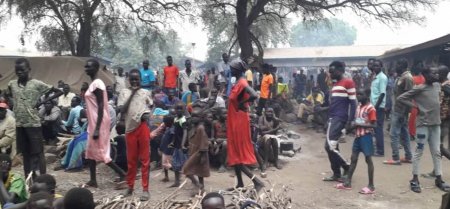
With global attention focused on the conflict in Ethiopia’s Tigray region, another crisis is unfolding in the country’s west. In February, the number of refugees and asylum seekers doubled in Pagak Reception Center on Ethiopia’s border with South Sudan, driven by conflict, food insecurity, and flooding in South Sudan.
A temporary receiving area the size of two soccer fields, Pagak is overcrowded and ill-equipped to handle the significant water, sanitation, health, and food needs of the more than 16,000 people currently seeking refuge there. Action Against Hunger conducted a mass screening of 1,979 refugee children younger than five years old in the Pagak Reception Center from February 17-19, 2021. The new data shows that 20.8 percent of the children were acutely malnourished, including seven percent diagnosed with severe acute malnutrition, the deadliest form of hunger. This prevalence is more than double what the UN Refugee Agency considers a serious public health emergency.
“Life was joyful and we had enough food until my husband died in the civil war. I came here because my children were starving,” said Nyabuony Puoch, a 30-year-old mother of four children. The family walked for seven days before they could borrow money to pay for transport to Pagak. Her youngest daughter is currently receiving treatment for malnutrition.
Typically, people like Nyabuony are resettled into official camps within a few weeks of arriving in Pagak, but COVID-19 has stalled registration and resettlement, leaving thousands of families stuck in overcrowded camp conditions and at risk of hunger and disease. The extent of COVID-19‘s spread is unknown due to inadequate testing.
Many of the new refugees and asylum seekers arrive malnourished, after traveling for several days or even weeks. According to Action Against Hunger, more than 70 percent of people in Pagak are women and children.
“It is a dire situation,” said Abdulwasi Yusuf, Action Against Hunger’s Field Coordinator for Ethiopia’s Gambella region, where Pagak is located. “Food supplies are extremely limited, and many refugee mothers have resorted to foraging in nearby forests for wild leaves and nuts to eat and feed their children. With no place to shelter, many families are exposed to the blazing sun and other elements all day and night, without relief.”
Pagak has substandard water and sanitation services, lacks a hospital, and has little capacity to provide other essential support. Conditions in the congested reception center make the outbreak and rapid spread of diseases, such as cholera and COVID-19, a real and dangerous possibility. Many refugees need additional medical treatment for malnutrition or other health issues, yet the nearest health center is more than 10 miles away, with no reliable transportation system.
Action Against Hunger is calling on the Government of Ethiopia to resume registration for refugees and asylum seekers, which would allow authorities to resettle thousands of vulnerable families in Pagak to official camps. Its teams also are providing lifesaving nutrition treatment to young children in Pagak and, with support from the World Food Program, UNICEF and the UN Refugee Agency. The organization is distributing high energy biscuits to children, pregnant women, and breastfeeding mothers and has scaled up its emergency nutrition program.
“Life is very difficult here because we came from far away, and do not have enough necessities like food, utensils, good shelter, soap, and bedding. We collect firewood, gather wild fruits to sell, and work often providing services such as carrying water for traders to subsidize the food gaps,” said Puoch. “Even if I am suffering now, I would rather tolerate the suffering than to go back.”
“Pagak is not a refugee camp. It’s a reception center where people are supposed to stay for days or weeks, not months,” says Panos Navrozidis, Country Director for Action Against Hunger in Ethiopia. “We urgently call on the Government of Ethiopia, the United Nations, and donors to support the relocation of the reception facility to a more suitable location. We need to improve conditions there, ensuring health and nutrition interventions, food rations, and basic water, sanitation and hygiene services, as well as an expansion of COVID-19 testing.”
SOURCE: Action Against Hunger







